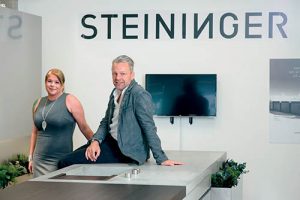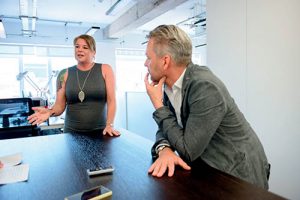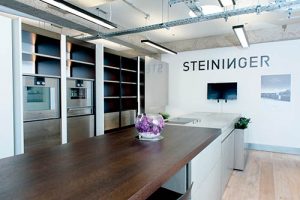‘This is really our big chance’
In the wake of Brexit, it may seem an inauspicious time to launch a niche Austrian kitchen brand into the UK. But with a compact showroom in the right part of town and designs that are as unobtrusive as they are adventurous, Steininger.International managing partner Harald Aichinger (pictured), and sales manager Jillian Knowlton, believe there’s plenty of potential. Rachel Ogden went to meet them
Q: Steininger’s well-known in Austria but not in the UK. Could you tell us more about the company?
Harald Aichinger: Steininger is a family company and currently in the third generation. It was set up by Martin Steininger’s grandfather, who started as a carpenter, and Martin took over the company about 14 years ago. Other people were doing the same thing – high-quality traditional kitchens – and as he had a background in industrial design, he wanted to run it in a different way. He decided that he wanted to work with new materials, so started with concrete. Steininger was the first to start making concrete kitchens, almost 12 years ago.

I joined Steininger four years ago, after working for Dedon, an outdoor furniture company. At that time, Steininger wasn’t an international business, so Martin and myself agreed over a few glasses of wine that it was time to set up a company together – Steininger.International. For the past few years, we’ve been exhibiting at the fair in Milan and finding the right partners who have the same ideas about design and quality. We do not want to become a big industry name, like Ewe, because we are sure that we have a small market. Our clients want to have something special.
Q: How easy is it to launch an Austrian brand in the UK?
HA: It’s not easy at all, starting with UK bureaucracy. Before we came to London, I didn’t have one grey hair! I thought that bureaucracy was bad in Germany, but the UK is quite something. I see that as a challenge. However, we’ve done our homework, and I think we are ready to enter the market.
Q: What are the other challenges you faced?
HA: Hardly anyone knows Steininger. That’s why we started four years ago with ad campaigns in publications, such as Wallpaper, and this is something we have to do all the time, not just for a year. That is why we have a budget of around a couple of hundred thousand euros each year to spend to make sure there’s brand awareness.
Q: How would you describe the Steininger brand?
HA: Very pure and monolithic. The slogan for the Rock kitchen says everything – ‘maybe no kitchen at all’. Right now, we think that the kitchen and the living room will become one. You have so many customers who spend a fortune on their kitchen and may not actually cook there – they use it just like a beautiful sports car.
The other big brands are in London, but it’s time for something new. I think this is really our big chance. Austria is a little country, but we have the quality from Germany and design from Italy, because we are in-between the two countries, and we take the best from each.
 Q: What’s your business strategy?
Q: What’s your business strategy?
HA: To find dealers, but not too many. A neighbouring country was the first step, so we went into Germany, which is why we are also based in Hamburg. The next thing was partners in the US. We already have one dealer in New York, another in Moscow, and another one about to come on board in Hong Kong. Here in London, we had the opportunity to team up with [furniture and interior design specialist] Wiesner Hager for our Clerkenwell showroom. There are so many architects based here, so that’s why I said London is a must – it’s a gateway to international projects. In the next three or four years, if business is growing as we expect, we’ll take the next step.
Q: Has Brexit affected your business plans?
HA: It has a little bit. However, the UK will be part of Europe somehow. At the end of the day, everybody wants to do business. The economy is important for the rest of Europe and for the UK as well. There won’t be an increase in pricing, we’ll keep it as it is. We’re not freaking out.
Q: Who are your main competitors and what do you offer that they don’t?
HA: Boffi and Bulthaup – and that’s it. We have all the experience with materials – concrete or even stone. We have a guy permanently in Italy who’s just in charge of quality control of our stone. We do everything. So, for example, if you have a kitchen in London, we would send our guys over. We even organised the crane for getting everything up to our showroom. With a big project in Paris, we had to organise a crane as well – and then there was the Charlie Hebdo bombing, so there were no cranes allowed in the city centre and that was an obstacle we had to deal with. This is our biggest advantage – we can do everything from A to Z.
Gaggenau and Miele are our main appliance suppliers, but if you go to Switzerland, we work with V-Zug. It’s about what the customer prefers. In the US, for example, we have to adapt to 30in appliances.
 Q: Who is the showroom primarily aimed at?
Q: Who is the showroom primarily aimed at?
Jillian Knowlton: The showroom is mainly for architects and designers. When you say you’re in Clerkenwell, they immediately know that it’s a designer area. If they want a huge showroom, they go to Wigmore Street, but I think we are more niche. Somebody could walk in here and think it’s just an island and some tall wall units, but there is so much going on and so many materials. I think designers and architects will understand that and relay that to their clients or they’ll come first and then they’ll send their clients.
HA: If it was a serious client, we also might invite them to spend a weekend in Vienna with their family to see the bigger showroom.
Q: What’s been the feedback on the showroom so far?
JK: I had a designer in here recently who saw us at 100% Design four years ago. She absolutely loved the showroom.
I’ve also been reaching out to designers, architects and St George’s Hill-type of developers who handle big projects. A lot of them have heard of the product already, so it’s just about getting a meeting in the diary with somebody.
HA: We also have contacts that we made in Milan, people who visited us and were interested in the brand and the product.
The most critical thing is you have to do one big project, let’s say two or three kitchens, then people start talking about it. The first kitchen is always the most difficult.
Q: What sort of financial targets do you have in mind?
HA: It’s not realistic to break even in the first year, but if we can do that in 2017 then that is good. Sooner or later, we want to make money, then invest it in a bigger showroom. It’s not a cheap kitchen we’re selling, but I think if we have the right customer who cares about quality and details, they’d understand why we’re at this kind of price level.
Q: What will be your balance of residential versus contract?
HA: The contract market is really not our market at all.
JK: Ultimately, we appeal to the architects and designers and their end client. Hopefully, our clients would then recommend us. I think it is going to be architects and designers that push their client to products they like. If they’re doing a modern build, they wouldn’t push for a traditional kitchen.
 Q: What sort of service do you offer clients?
Q: What sort of service do you offer clients?
HA: We do everything. Normally, the architects would come up with some proposals, but we would have a look at it, because not all of them are specialists when it comes to kitchen designs. We’d sit down with the architect or the customer and go through every detail, starting with the appliances, what kind of ventilation they need, what kind of materials they want, then we double-check every measurement.
Once this is done, we work on a quote and proposals, come up with the renderings and present to the customer. From the time that everything is decided, it takes three months for the production time for the whole kitchen. It’s all made in St Martin, a small town in Austria.
Q: Are more online-savvy consumers affecting the sort of kitchens you’re selling?
HA: To a degree. If they come up with crazy ideas, it’s a cool challenge. Just the other day we had a famous ski racer, Alexandra Meissnitzer, and she wanted to have a kitchen made of copper. Nobody had done this before. And we said okay. Unless a kitchen is completely unrealistic, we see this as a challenge. It may take longer, because we have to double-check certain things, but then we would come up with some ideas.
We also have a project in Germany and the client is in the cruise ship industry. We’re making him a black stainless-steel kitchen as it reminds him of the big cruise ships.
Q: What would be your ideal outcome of launching the brand in the UK?
HA: That the Steininger brand is recognised as one of the best kitchen brands that you can get in London. Not within the next two years, but within 10. This is our definite target.
